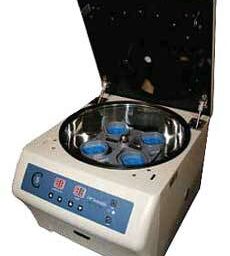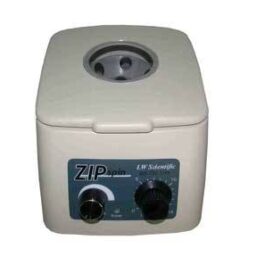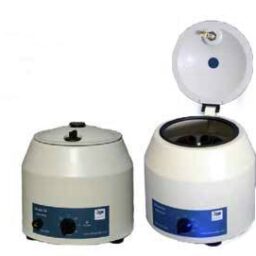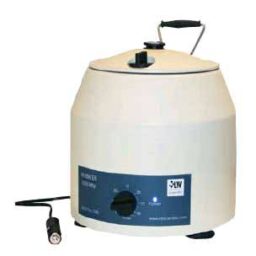A Centrifugal Machine For Every Lab
-
Swing-Out, 24-Place Centrifuge
Item# 3T51-VSKB-C5CLWRated 0 out of 5$3,035.63Original price was: $3,035.63.$2,248.61Current price is: $2,248.61. Select optionsHorizontal separation offers many advantages over traditional fixed-angle separations, including tighter straight-line gel separations to reduce re-spins and re-mixes. This centrifuge with 24-place bucket rotor, spins 24 test tubes, up to 17.5 x 105mm, at speeds up to 4,000 rpm,with microprocessor speed control. Includes 3-prong power cord, tube shields and tube cushions (for shorter tubes).
-
Portable Micro Centrifuge
Item# 3020-VA60-CPZLWRated 0 out of 5$324.38Original price was: $324.38.$240.28Current price is: $240.28. Select optionsThis centrifuge has a maintenance-free brushless motor. It includes a 6-place rotor for 1.5 and 2ml micro-tubes and a 12-place rotor for 0.5ml micro-tubes. It is designed for cell separations, microfiltration of HPLC samples, and DNA preparations.
-
Fixed Speed Centrifuge
Item# 3051FA8U-C8ELWRated 0 out of 5$543.26Original price was: $543.26.$402.42Current price is: $402.42. Select optionsThis is an economical fixed speed centrifuge designed to fit any budget. This unit accommodates most test tubes from 3ml – 15ml. It includes 8-place tube rotor, eight 15ml tube sleeves and eight 13x75mm tube sleeve inserts.
-
Portable 8-Place Centrifuge
Item# P051-FA80-C8ELWRated 0 out of 5$544.67Original price was: $544.67.$403.46Current price is: $403.46. Select optionsThis portable fixed speed 8-place centrifuge is designed to fit the needs of mobile medics and traveling lab technicians.
Centrifugal machines serve as indispensable tools for a myriad of applications, ranging from cellular analysis to sample separation and purification. As laboratories continue to evolve and diversify in their pursuits, the availability of centrifugal machines tailored to specific needs and requirements becomes increasingly crucial. In this comprehensive guide, we delve into the world of centrifugal machines, examining the diverse types, applications, and benefits they offer to laboratories across various disciplines.
Introduction to Centrifugal Machines:
Centrifuges, another name for centrifugal machines, are devices that use centrifugal force, a strong force, to separate various parts of mixtures. Pretend that you have a container that is full of a mixture of materials, such as water and oil, that you would like to separate. This container is rapidly spun for a centrifuge to function. The centrifuge creates a force as it spins, separating the mixture’s components based on their respective weights. The reason for this separation is that the heavier materials are pushed further away from the center of rotation because they are more difficult to move. By separating substances according to their density, size, or molecular weight, scientists and researchers can more efficiently assess and investigate the various components of a combination.
Microcentrifuges
Microcentrifuges are compact and intended for small sample quantities, microcentrifuges are essential in molecular biology and DNA analysis, where accuracy and speed are critical.
Refrigerated Centrifuges
Refrigerated centrifuges are equipped with cooling systems, which are crucial for maintaining temperature-sensitive samples like proteins and enzymes. These centrifuges also precisely control the temperature during sample processing, which is crucial for maintaining sample integrity and stability, especially for sensitive biological samples.
Benchtop Centrifuges
Benchtop centrifuges are common in research and clinical settings because of their performance and versatility. They can handle a variety of tube sizes and sample volumes for a range of uses. Widely used across labs, they perform tasks like blood tests and chemistry experiments with efficiency and reliability.
Ultracentrifuges
Ultracentrifuges are capable of reaching extremely high speeds and producing remarkable centrifugal forces, which makes them suitable for advanced uses such as protein purification, density gradient centrifugation, and molecular biology research. Their proficiency in molecular biology allows researchers to investigate complicated cellular structures and interactions with unmatched accuracy.
Applications of Centrifugal Machines:
Cellular and Molecular Biology:
Centrifuges are essential tools in the field of cellular and molecular biology research because they make it easier to perform procedures like protein isolation, organelle purification, DNA/RNA extraction, and cell pelleting. Centrifugation improves the study of cellular architecture, functions, and molecular interactions by allowing researchers to separate components of cells according to density.
Biochemistry and Proteomics:
Centrifugation techniques are integral to biochemistry and proteomics studies, Because they make it possible to separate macromolecules, analyze protein complexes, and fractionate subcellular components, centrifugation techniques are essential to biochemistry and proteomics research. Centrifuges help in understanding of biological processes, protein interactions, and disease caused by sorting biomolecules according to their physical and chemical characteristics.
Clinical Diagnostics:
Centrifugal machines are used in clinical laboratories to support medical diagnostics and patient care through the manufacture of plasma, serum separation, blood cell counting, and diagnostic assays. Centrifuges make it possible to analyze biological material quickly and precisely, which helps with illness management, patient care, and medical diagnostics.
Industrial and Environmental Analysis:
Applications for centrifugal machines in industrial and environmental analysis include the treatment of wastewater, the search for oil and gas, environmental monitoring, and manufacturing process quality control. Centrifugation makes it possible to separate and purify pollutants, contaminants, and particle matter. It also makes it easier to analyze and remediate environmental concerns and ensures that regulations are followed.
Benefits of Centrifugal Machines:
Efficient Sample Processing:
Centrifuges separate components quickly according to their density, size, or molecular weight, which speeds up sample processing and analysis. Because of the quicker turnaround times, researchers can conduct experiments and analysis more effectively, which boosts productivity in the lab.
Sample Preservation:
Centrifuges reduce the chance of contamination or sample degradation by reducing sample handling and exposure to outside influences. Centrifuges preserve the accuracy and dependability of experimental results by keeping samples stable during processing.
Precision and Reproducibility:
With their ability to precisely manage rotor speeds, acceleration/deceleration rates, and centrifugal forces, centrifuges guarantee precise and reliable outcomes. The reliability and validity of scientific findings can be improved by researchers by fine-tuning centrifuge parameters to enhance sample recovery and optimal separation efficiency.
Versatility and Adaptability:
Centrifugal machines can be used with a wide range of laboratory techniques and applications since they can handle a wide variety of sample kinds, sizes, and volumes. Centrifuges are flexible tools that can be used for a wide range of research applications, including the isolation of individual cells, the purification of biomolecules, and density gradient separations.
Space Efficiency:
Centrifugal machines are perfect for labs with limited bench space or storage because of their compact and space-saving designs. Their compact size makes it possible to use lab space more effectively, allowing researchers to increase productivity without sacrificing experimental capabilities.






